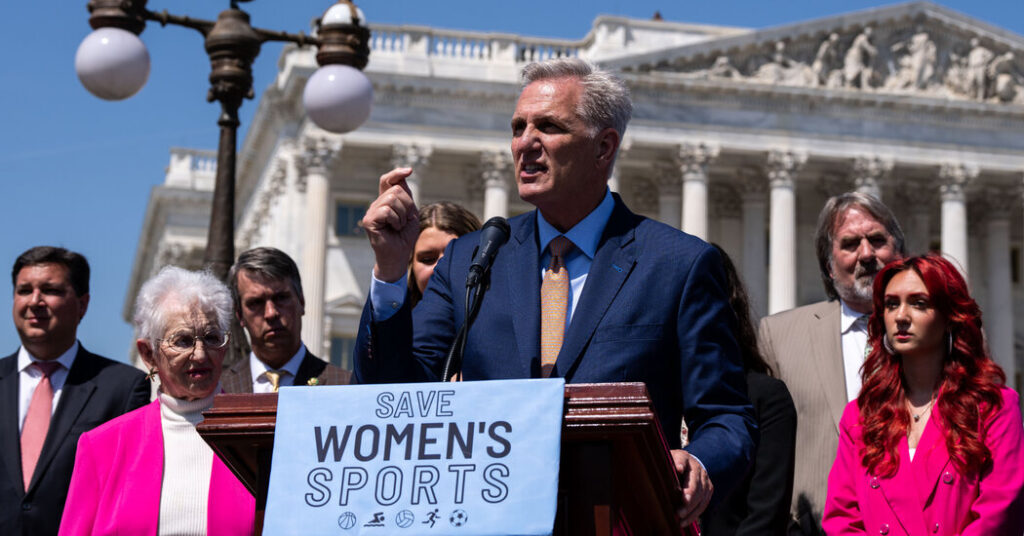WASHINGTON — House Republicans on Thursday approved legislation that would bar transgender women and girls from participating in athletic programs designated for women, the latest effort in a nationwide push by conservatives to restrict transgender rights as they make culture issues a centerpiece of their political message.
The bill, approved entirely along party lines on a vote of 219 to 203, was the latest attempt by House Republicans to take up a potent social issue that has rallied their base and been championed at the state level by Republican lawmakers.
The bill has no chance of passing the Democratic-controlled Senate or being signed by President Biden. In a statement of administration policy, the White House said Mr. Biden would veto it if it made its way to his desk. A national ban that does not take into account competitiveness or grade level “targets people for who they are and therefore is discriminatory,” the White House said.
In debating the bill, Republicans sought to present themselves as the party of common sense fighting against an extreme agenda on the left.
“We’re in a battle for the very survival of women’s sports,” said Representative Aaron Bean, Republican of Florida, adding, “Not everybody has gone off the deep end.”
Representative John W. Rose, Republican of Tennessee, said the issue was straightforward. “Biological males ought to compete against biological males, and biological females ought to compete against biological females,” he said. “Most Tennesseans consider this to be common sense.”
But Democrats dismissed the bill as “hateful” and “insidious,” part of a “radical” education agenda that Republicans have advanced in their first several months in the majority.
Last month, House Republicans approved legislation that would mandate that schools make library catalogs and curriculums public, and require parental consent before honoring a student’s request to change their gender-identifying pronouns.
Democrats argued that the legislation to bar transgender women from participating in women’s sports helped to fuel a hate campaign against transgender children, a vulnerable population with high rates of bullying, depression, anxiety and attempts at suicide.
And they criticized Republicans for harnessing a few examples from the ranks of elite sports of transgender athletes competing against and beating women — examples, they argued, that have little to do with elementary- and middle-school students who simply want to be included in school activities.
“These bills tell some of the most vulnerable children in our country that they do not belong,” said Representative Pramila Jayapal, Democrat of Washington, whose daughter is transgender. She added, “Don’t use our kids as punching bags and put them in danger.”
Democrats also argued that enforcing such a bill would require invasive examinations. “How do you verify a girl’s, quote, reproductive anatomy?” Ms. Jayapal said. “If a young girl, if your daughter, doesn’t look feminine enough, is she subject to examination? This is absolutely absurd.”
About 1.3 million adults and 300,000 youths in the United States identify as transgender. Twenty-one states have enacted laws to bar transgender athletes from participating in sports aligned with their gender identity, according to the Movement Advancement Project, a think tank that tracks L.G.B.T.Q. laws.
“Recognizing that we are all God’s children, I rise in opposition to this legislation,” said Representative Nancy Pelosi, Democrat of California, “because trans kids are all God’s children, belong in sports, in schools, in books, in families and on teams.”
She added, “Trans kids listen and hear what we say, and we do not want to do them harm, for whatever purpose, on the floor of this House.”
Ms. Pelosi said the bill was an “insult” to the goals of fairness and inclusion intended by lawmakers who passed the landmark Title IX legislation in 1972, which gave young women the same athletic opportunities as their male counterparts in schools.
This month, the Biden administration proposed a rule that would allow schools to bar some transgender athletes from competing on sports teams that match their gender identities. But the rule would forbid blanket bans on transgender athletes in school sports, making such a move a violation of Title IX.
The House bill would not entirely bar transgender women from participating in women’s sports. It includes the caveat that transgender athletes could train or practice with a women’s athletic team “so long as no female is deprived of a roster spot on a team or sport” or an opportunity for a scholarship or other benefit.
Representative Nancy Mace, Republican of South Carolina, successfully offered an amendment to the bill to study the psychological effects on girls of allowing transgender athletes to compete with them.
“This is not against the L.G.B.T.Q. community,” she said. “We are pro-women today.”


